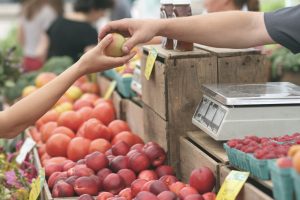Back

Blog
Food hubs, dedicated to local agriculture, also influence regional economic development
 Food hubs are a vehicle used to strengthen local agriculture while making healthy and affordable food available to more communities. They are defined as an organization that facilitates the aggregation, storing, processing, distribution, and marketing of locally or regionally produced food products. Several cities have seen that food hubs can also mobilize multiple aspects of the food industry, and in turn help get the wheels of local economies moving.
Food hubs are a vehicle used to strengthen local agriculture while making healthy and affordable food available to more communities. They are defined as an organization that facilitates the aggregation, storing, processing, distribution, and marketing of locally or regionally produced food products. Several cities have seen that food hubs can also mobilize multiple aspects of the food industry, and in turn help get the wheels of local economies moving.
Over the last few years Springfield, Oregon has seen the success of a weekly outdoor farmers’ market grow into the Sprout! Regional Food Hub. Located inside of a renovated church, Sprout! provides local farmers with a venue to sell their goods year-round, while improving access to healthy, affordable foods in an area that has been considered a food desert. A commercial kitchen inside of Sprout! doubles as a space for food entrepreneurs to experiment with new ingredients, refine their menus and create business plans. The Community Development Corporation (CDC) that operates the facility also provides small business support services to help ensure success.
Those companies include 100-Mile Bakery, which sources all ingredients from within a 100-mile radius. Owner Leda Hermecz says the ability to operate out of Sprout! has been critical to the bakery’s success.
“Sprout! is so unique. I’ve never seen a facility that has a business incubator, commercial kitchen, and a farmers’ market,” she said. “My goal is to move into one of [Sprout!’s anchor] spaces and keep using the kitchen, [while] also adding farmers’ value-added products to my offering, like all those famers that do their one canned item along with their farm.”
There’s been similar success in places like Columbus, Ohio, where the “Food Fort” provides food entrepreneurs with access to specialized training resources, marketing and sales assistance, and a commercial kitchen. The Food Fort attracts a diverse group of “foodies” and actively encourages collaboration amongst each other. Like Sprout!, the Food Fort is a program headed by the local Community Development Finance Institution (CDFI),meaning they can provide low-cost business loans to the 40+ businesses that now call the Food Fort home.
In Detroit, the nationally-renowned Eastern Market has recently completed an $8.5 million expansion. The “Shed 5” project now allows Eastern Market to provide a community kitchen, or “kitchen commons,” for entrepreneurial development that’s also open for community events.
Food hubs thriving in places like Springfield, Columbus and Detroit is consistent with what ICIC research has uncovered about food clusters. They are ideally suited to be foundational in inner city economic development strategies:
- Food is important in every geography. Everybody eats, which gives each city the opportunity to draw up its own unique job-creating food strategy that meets their local identity.
- Inner cities are home to a disproportionate number of universities, hospitals, sports stadiums and cultural venues – all large buyers of food and all increasingly interested in sourcing fresh, locally-produced goods.
- The diversity and density of the urban population provides a chance to cater to multiple niche markets that are underserved by traditional producers.
- Inner cities’ central locations, access to multi-modal transportation hubs and even underutilized manufacturing and warehouse space can all be leveraged by companies in the food cluster.
- About 60% of workers in the food industry have a high school diploma or less, making food cluster jobs uniquely accessible to inner city residents.
ICIC has also helped communities across the U.S. develop their food cluster strategies, and learned several insights in the process.
At $5.3 trillion, the U.S. food industry is booming, and some experts believe it will continue to grow at a steady pace through 2022. Food hubs are proving to be one way to get more of this money to stay in local economies. The expansion of food hubs and strengthening of local food systems provides benefits across the board, creating healthy communities and economic conditions – quite literally – from the ground up.
